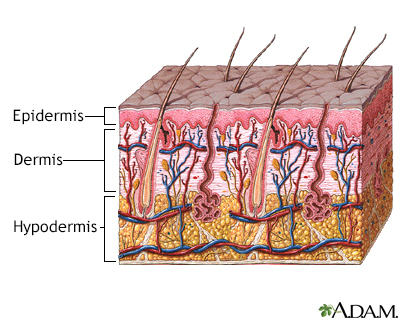Dermatoses - systemic
Definition
Dermatoses is a general term used to describe any skin defect or lesion on the skin. Systemic means it affects the whole body, rather than just one part. Systemic dermatoses may be linked to problems in other organs.
Examples of the most common dermatoses include:
Gallery

References
Dinulos JGH. Cutaneous manifestations of internal disease. In: Dinulos JGH, ed. Habif's Clinical Dermatology. 7th ed. Philadelphia, PA: Elsevier; 2021:chap 26.
Fiorentino DF, Werth VP. Skin and rheumatic diseases. In: Firestein GS, Budd RC, Gabriel SE, Koretzky GA, McInnes IB, O’Dell JR, eds. Firestein & Kelley's Textbook of Rheumatology. 11th ed. Philadelphia, PA: Elsevier; 2021:chap 46.